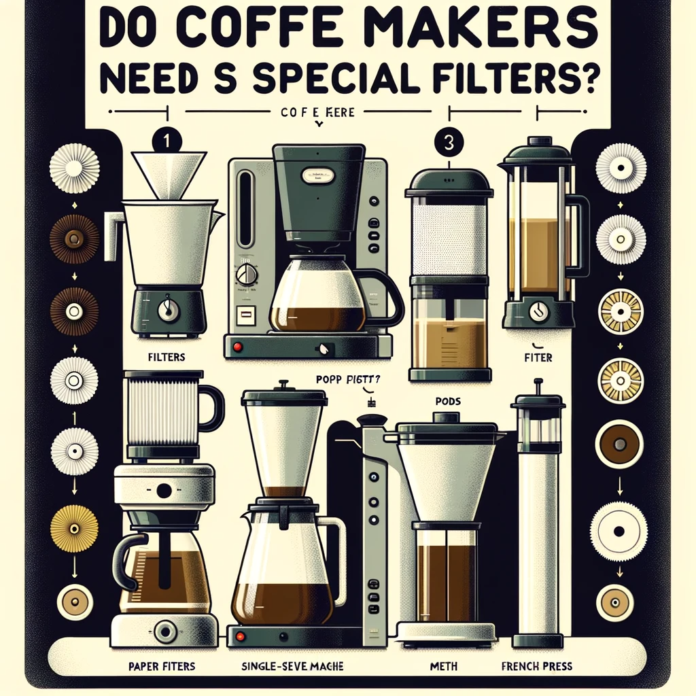Are you a coffee lover who can’t start their day without a steaming hot cup of joe? Well, if you’ve ever wondered whether your coffee maker requires special filters, you’ve come to the right place. In this article, we will uncover the truth behind whether coffee makers need special filters or if any regular filter will do. So grab your favorite mug, sit back, and let’s explore the world of coffee filters together.
Types of Coffee Filters
Paper Filters
Paper filters are the most commonly used filters in coffee brewing. These filters are made from porous paper that allows water to pass through while trapping coffee grounds. They are available in various sizes to fit different coffee makers. Paper filters are affordable, disposable, and easy to use. They effectively remove sediments from the brewed coffee, resulting in a smooth and clean cup of joe.
Metal Filters
Metal filters, also known as mesh filters, are a popular alternative to paper filters. They are typically made from stainless steel and have a fine mesh design. Metal filters allow more oils and particles to pass through, resulting in a fuller-bodied and more flavorful cup of coffee. They are reusable, eco-friendly, and can be easily cleaned. Metal filters are compatible with most coffee makers but may require some adjustment in grind size.
Cloth Filters
Cloth filters, also called fabric or cotton filters, are another option for coffee brewing. These filters are made from natural fibers like cotton or hemp. Cloth filters offer a unique brewing experience as they allow more oils and flavors to pass through while removing some sediments. They can be reused and are environmentally friendly. However, they require regular cleaning and maintenance to prevent the buildup of coffee oils and residues.
Function of Coffee Filters
Removal of Sediments
One of the primary functions of a coffee filter is to remove sediments from the brewed coffee. Sediments are tiny particles or grounds that may affect the taste and texture of the coffee. Paper filters effectively trap these sediments, resulting in a clean and smooth cup of coffee. Metal filters and cloth filters also remove some sediments, but to a lesser extent.
Extraction of Flavor
Coffee filters play a crucial role in extracting the desired flavors from the coffee grounds. They act as a barrier between the brewed coffee and the grounds, allowing water to flow through while retaining the flavors and oils. Paper filters tend to absorb some of the oils, resulting in a lighter-bodied and cleaner tasting coffee. Metal filters and cloth filters, on the other hand, allow more oils to pass through, resulting in a richer and more robust flavor profile.
Retention of Oils
While paper filters are known for their ability to remove oils from the coffee, metal and cloth filters retain more of these oils. The oils in coffee contribute to its aroma, taste, and mouthfeel. Paper filters help in reducing the amount of oil in the final cup, particularly if you prefer a lighter and less greasy coffee. Metal and cloth filters allow more oils to pass through, resulting in a fuller-bodied and more aromatic brew.
Compatibility of Filters
Brand-Specific Filters
Some coffee makers require specific filters that are designed and recommended by the manufacturer. These brand-specific filters may have unique shapes or sizes that fit perfectly into the coffee maker’s filter holder. It is important to use the recommended filters to ensure proper functioning and optimal brewing results. Using non-compatible filters may lead to leakage, clogging, or subpar coffee.
Universal Fit Filters
Many coffee makers have filter holders that can accommodate various types of filters. These universal fit filters come in standard sizes that are compatible with multiple coffee makers. They offer flexibility and convenience, allowing you to choose between paper, metal, or cloth filters depending on your preference. Universal fit filters are readily available in stores and online, making it easy to find a suitable filter for your coffee maker.
Effect on Brew Quality
Taste
The choice of coffee filter can significantly impact the taste of the brewed coffee. Paper filters tend to produce a cleaner and smoother cup, with less bitterness and acidity. They remove some of the oils and sediment that may contribute to an undesirable taste. Metal filters and cloth filters, on the other hand, allow more oils and flavors to pass through, resulting in a bolder and more pronounced taste. The taste preference largely depends on personal preference.
Sediment Presence
Coffee filters play a crucial role in reducing the presence of sediments in the brewed coffee. Paper filters are highly effective in trapping these sediments, resulting in a sediment-free cup of coffee. Metal and cloth filters also remove some sediments but may allow a small amount to pass through. If you prefer a clean and clear coffee without any visible sediments, paper filters are the ideal choice.
Flavor Extraction
The type of coffee filter used can impact the extraction of flavors from the coffee grounds. Paper filters tend to absorb some of the oils and flavors, resulting in a lighter and cleaner tasting coffee. Metal filters and cloth filters allow more oils and flavors to pass through, resulting in a richer and more aromatic brew. The choice of filter depends on the desired flavor profile and individual preferences.
Filter Lifespan and Replacement
Manufacturer Recommendations
It’s essential to follow the manufacturer’s recommendations when it comes to the lifespan and replacement of coffee filters. Some filters are designed for single-use and should be replaced after each brewing session. Others, such as metal and cloth filters, are reusable and can be used multiple times. Manufacturers often provide guidelines on the recommended lifespan of their filters, including cleaning instructions and replacement intervals.
Visual Inspection
Another way to determine the lifespan of a coffee filter is through visual inspection. Paper filters may become discolored or tear after use, indicating that they need to be replaced. Metal and cloth filters may develop stains or buildup over time, which can affect the taste and performance. Regularly checking the condition of the filter will help ensure optimal brewing results and prevent any potential issues.
Taste Test
A taste test can also be used to determine the lifespan of a coffee filter. If the brewed coffee starts to taste off or develops an unpleasant flavor, it may indicate that the filter needs to be replaced. The buildup of oils and residues in reusable filters can impact the taste of the coffee. Paying attention to any changes in flavor will help maintain the quality of your brew and determine when it’s time for a filter replacement.
Environmental Impact of Filters
Paper Filters
Paper filters are generally considered more environmentally friendly compared to other types of filters. They are biodegradable and can be easily composted. However, the production and disposal of paper filters contribute to deforestation and waste. Opting for unbleached or recycled paper filters can help reduce the environmental impact. Some brands also offer paper filters made from sustainable materials, further minimizing the carbon footprint.
Metal Filters
Metal filters offer a more sustainable alternative to paper filters. They can be reused multiple times, reducing the amount of waste generated. Metal filters are typically made from stainless steel, which is a recyclable material. They require less frequent replacement and can last for years with proper care. Choosing a metal filter helps decrease the overall environmental impact associated with disposable filters.
Cloth Filters
Cloth filters are another eco-friendly option for coffee brewing. They can be reused numerous times, significantly reducing waste. Cloth filters are typically made from natural fibers like cotton or hemp, which are biodegradable and renewable resources. However, the cleaning and maintenance of cloth filters use water and energy. It is important to strike a balance between the environmental benefits of reusable filters and the resources required for their upkeep.
Cost Analysis
Disposable Filters
Paper filters are the most economical option in terms of upfront cost. They are widely available and come in bulk packs, making them affordable for everyday coffee brewing. However, the cost can add up over time, especially if you brew coffee frequently. Disposable filters need to be replaced after every use, which can be an ongoing expense. It is essential to consider the long-term cost when opting for disposable filters.
Reusable Filters
Metal and cloth filters have a higher upfront cost compared to disposable filters. However, they offer long-term cost savings as they can be reused multiple times. While metal filters may require occasional cleaning and maintenance, cloth filters require regular washing. The cost analysis depends on the frequency of use, with reusable filters becoming more cost-effective over time. Investing in a durable and high-quality filter can further maximize the value.
Pros and Cons of Special Filters
Advantages
Special filters, such as metal and cloth filters, offer several advantages over traditional paper filters. They allow for more oils and flavors to pass through, resulting in a richer and fuller-bodied cup of coffee. Special filters are also reusable, reducing waste and the need for frequent replacements. They offer flexibility in terms of flavor extraction and allow coffee enthusiasts to experiment with different brewing methods.
Disadvantages
However, special filters also have some disadvantages to consider. Metal filters may allow fine sediment to pass through, resulting in a slightly grittier texture. They require adjustment in grind size to prevent clogging or over-extraction. Cloth filters require regular cleaning and maintenance to prevent the buildup of coffee oils. The reusable nature of special filters also requires an initial investment, which may deter some individuals.
Alternatives to Special Filters
DIY Filters
If you don’t have access to specialized coffee filters, there are DIY alternatives that can be used. One popular option is using a paper towel or cheesecloth as a makeshift filter. Simply fold the paper towel or cheesecloth to fit the filter holder and secure it in place. While not as effective as dedicated coffee filters, these makeshift options can still provide a decent cup of coffee in a pinch.
Fine Mesh Sieves
Another alternative to special filters is using a fine mesh sieve. This method involves pouring the brewed coffee through a fine mesh sieve to remove any large sediments. While this may not capture all the sediment particles, it can help improve the clarity of the coffee. Fine mesh sieves are readily available in most kitchens and can be a convenient option when traditional filters are unavailable.
When to Use Special Filters
Brewing Specialty Coffee
Special filters, particularly metal filters, are often preferred when brewing specialty coffee. Specialty coffee tends to have unique flavors and characteristics that can be accentuated by metal filters. The ability of metal filters to allow more oils and flavors to pass through results in a more nuanced and complex cup of coffee. It is an excellent choice for those who want to explore the subtleties of specialty coffee.
Brewing with Grounds
Using special filters, such as metal or cloth filters, can be beneficial when brewing coffee with grounds instead of pre-packaged coffee pods or capsules. Ground coffee allows for more control over the brewing process, allowing coffee enthusiasts to experiment with different grind sizes and brewing methods. Special filters enhance the extraction of flavors from the grounds, resulting in a more customized and personalized coffee experience.
In conclusion, coffee filters play a vital role in the coffee brewing process. Paper filters effectively remove sediments and produce a clean and smooth cup of coffee. Metal filters and cloth filters allow for the extraction of more flavors and oils, resulting in a fuller-bodied and more flavorful brew. The choice of filter depends on personal preference, desired taste profile, and environmental considerations. Whether opting for disposable paper filters or reusable metal or cloth filters, choosing the right filter can enhance your coffee brewing experience.




